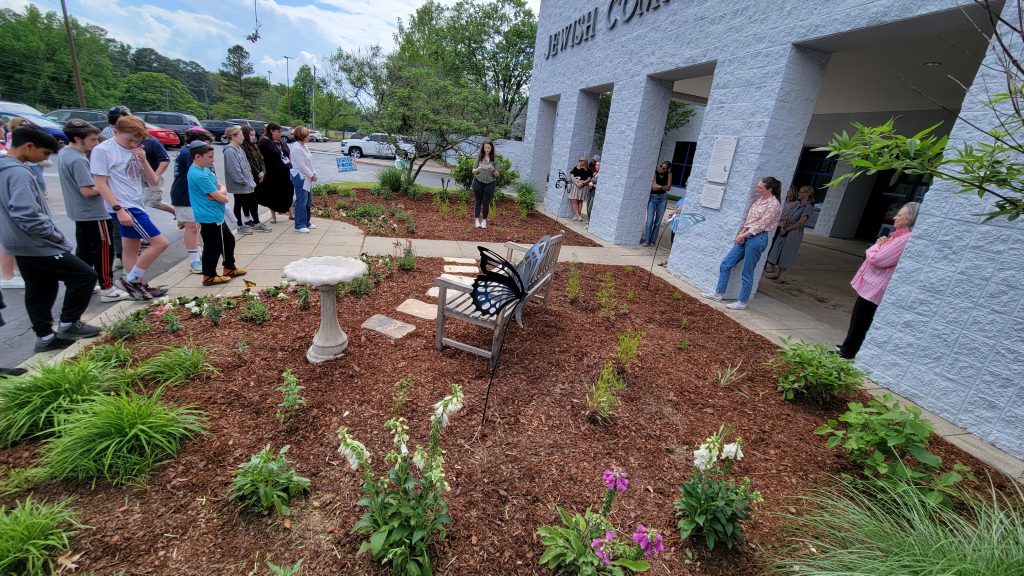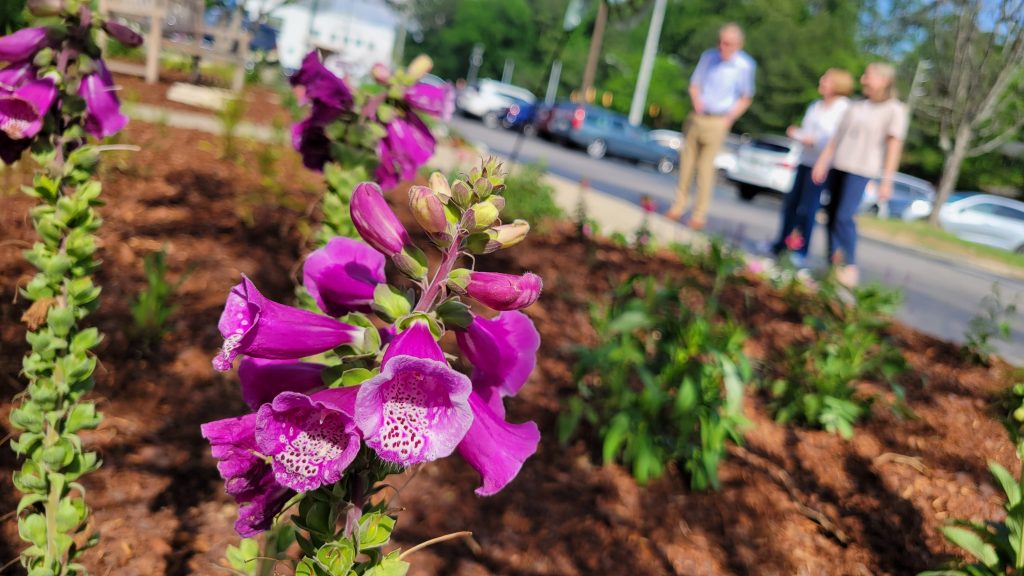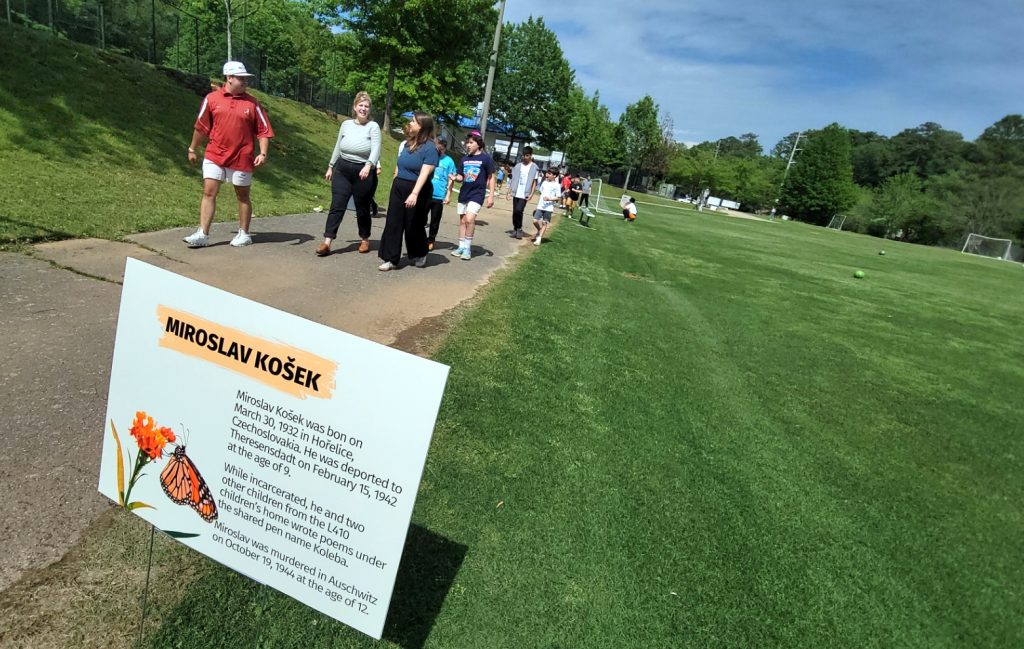To mark Yom HaShoah | Holocaust Remembrance Day on Thursday we held a ceremony in front of the Levite Jewish Community Center to dedicate a refreshed butterfly garden. The event was preceded by two days of planting by staff and volunteers (huge shout-out to Sarah Silverstein Mackintosh and Floris Van Os!) and a butterfly release by Cohn Early Childhood Learning Center students in the morning (see video).
The event ended with a walk around the Levite Field track to read panels of poetry written by children during the Holocaust.

Zoe Weil, director of special programs in The J’s Office of Jewish Life, made the following remarks during the dedication:
“Today is Yom HaShoah or Holocaust Remembrance Day. Its full name, Yom HaShoah Ve-Hagevurah, literally translates to ‘The Day of Remembrance of the Holocaust and the Heroism.’ This date was chosen for its proximity to the Warsaw Ghetto Uprising — a powerful act of Jewish resistance during the Holocaust.
“The connection to resistance is significant, especially in how Holocaust memory is shaped. In the United States, Holocaust education often emphasizes the unimaginable suffering and loss experienced by Europe’s Jews. In contrast, Israeli Holocaust education frequently begins with stories of courage and defiance — narratives that remain unfamiliar to many Americans. This difference reflects a broader emphasis in Israel on resilience and heroism alongside remembrance.
“For those not familiar, and because I’m a history teacher, I can’t resist the opportunity to teach a bit more about the Warsaw Ghetto Uprising to emphasize why we commemorate it. The Warsaw Ghetto was the largest ghetto in Nazi occupied Europe. At its peak, about half a million Jewish men, women, and children were forced into a 2.5-square-mile section of the city. Ghetto residents were subject to inhumane living conditions, with tens of thousands dying from hunger and starvation alone.
“But the Jewish community was always committed to resistance. They secretly established schools, soup kitchens, and cultural activities like adult education programs and orchestra performances. Historian Emanual Ringelblum even led an underground effort to preserve documents, artifacts, testimonies, and other records of Jewish life in the ghetto. His team buried countless documents to be discovered by later generations, so that they could tell their own history. So far, 35,000 documents have been found. It is believed that still more will be discovered.
“These acts of resistance are powerful examples of Jews risking their lives to preserve their humanity, their stories, and their future. From the moment the Warsaw Ghetto was established in 1940, it became a place not only of suffering, but of quiet, determined defiance. By April 1943, that defiance erupted into armed resistance. In response to the final wave of deportations to extermination camps, Jewish fighters launched a military uprising. Armed with only a small collection of smuggled weapons and improvised explosives, they held off 2,000 Nazi soldiers and police, backed by artillery and tanks, for 27 days — longer than the Polish army resisted at the start of World War II.
“By mid-May, the Nazis had crushed the uprising and razed the ghetto to the ground. Aside from a few survivors, all remaining Warsaw Jews were captured and deported to extermination camps.
“As we honor this extraordinary act of physical resistance, we also recognize the courageous forms of spiritual resistance — those expressed through the preservation of voice, identity, and the human spirit. In our newly revitalized garden, you’ll find ‘The Butterfly’ by Pavel Friedman, etched in stone — a poem our guest Esther Levy will read aloud. Pavel’s words were the inspiration behind this garden project. We set out not only to enhance the beauty of our Holocaust memorial, but also to symbolically and literally bring butterflies back to this space. Planted with native species that attract pollinators, the garden is now a place of remembrance, renewal, and hope.
“After this brief ceremony, we invite you to continue bearing witness by reading additional poems written by children during the Holocaust, displayed along the outdoor track. Each one is a testament to resilience and the unbreakable spirit of those who refused to be silenced.
“Today, we remember not only the horrors of the Holocaust, but also the strength, courage, and resilience of those who lived — and resisted — through it. The legacy of their defiance, whether through arms, words, song, or spirit, calls on each of us to carry their memory forward with purpose.
“Let these poems, this garden, and this day be more than symbols. Let them be reminders of our duty to never forget, and to ensure that such darkness never takes root again.
“Thank you for being here. Thank you for remembering. And thank you for helping us keep their stories alive.”
This project was funded in part by the Cy Steiner Community Education Fund at the Birmingham Jewish Foundation and Repair the World.


